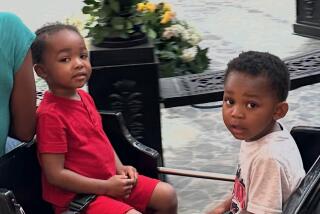A young girl pines for her twin
- Share via
GAOPING, CHINA — In a village tucked deep in a lush valley of Hunan province, 9-year-old Zeng Shangjie dutifully practices writing the English alphabet.
When she learns enough to find the words to express herself, she wants to write a letter to the twin she believes has become an American.
Dear sister. Do you miss home? When are you coming home to me?
The twins were separated before their first birthday, when their mother, Yuan Zanhua, a migrant worker, went off to another province. Afraid she wouldn’t be able to handle two babies in addition to an older daughter, Yuan took Shangjie, strapping her to her back, and left the other twin, Xiuhua, with her brother and sister-in-law in the countryside.
Then on May 30, 2002, a dozen officials from the local family planning office stormed Yuan’s brother’s house. They grabbed 20-month-old Xiuhua, shoved her into a car and drove off.
Although couples aren’t supposed to be penalized for having twins, and this rural family was entitled under Chinese law to a second child because their first was a girl, the family planning officials demanded 6,000 yuan, then about $750. The brother had the money, but when he went to get the girl back, they demanded 2,000 yuan more.
“My brother borrowed money from all the families in the village, a little here and a little there. If people could only give 10 yuan, they did,” says Yuan. But when her brother handed over the money, the family planning officials again raised their demands.
“He’d already borrowed money from hundreds of people,” she says. “There was just no way he could get any more.”
By the time Yuan got home, Xiuhua had been sent to the orphanage in nearby Shaoyang. When she complained to the family planning office, she says, the officials sneered at her: “Why did you give birth to so many babies?”
Along with other villagers, Yuan and her husband signed a petition accusing family planning officials of illegally confiscating babies. They had it delivered to Beijing but they never got a response.
“Twins belong together,” she says. “They should never be separated.”
The two girls were almost indistinguishable. Although not identical, they had the same heart-shaped faces, bow lips and a distinctive bump on their left earlobes. Xiuhua was the more docile of the two, which was why she was chosen to stay behind with the brother.
No doubt, the twins would have less in common today. Shangjie, as slender as the stalks of bamboo around the village, hikes three miles each way to her elementary school. No longer the rebellious toddler, she helps her parents with the animals: a cow, three pigs, chickens and ducks.
As for Xiuhua? “What is she like today? I don’t know. I don’t even know what country she’s in or even whether she’s still alive,” Yuan says. Her best guess is the United States, the destination for many babies from the province. That is why Shangjie’s favorite subject at school is English.
Shangjie makes a regular entreaty, the way some children beg for toys or treats. She pulls at her mother’s arm and asks, “When are you going to get my sister back?”
--
More to Read
Sign up for Essential California
The most important California stories and recommendations in your inbox every morning.
You may occasionally receive promotional content from the Los Angeles Times.









